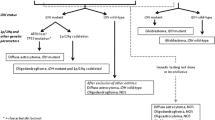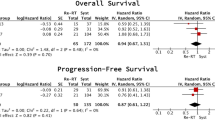Abstract
Bevacizumab has been introduced in the management of high-grade gliomas after preliminary studies that showed an acceptable safety and a marked increase in clinico-radiological responses in comparison with second-line chemotherapy. The objective is to synthetically review the present use of bevacizumab—alone or in combination—in the context of recurrent high-grade glioma and highlight the future developments. The methodology of this study is to analyse and discuss relevant literature studies using bevacizumab in recurrent high-grade glioma. Bevacizumab may be used as single-agent therapy in recurrent high-grade glioma, with good clinico-radiological responses having little effect on survival. The open questions and developments include new MRI criteria for evaluation of response to anti-angiogenic agents, the identification of putative factors predicting response/failure of bevacizumab and the introduction of bevacizumab in first-line management of high-grade glioma.
Similar content being viewed by others
References
Salmaggi A, Eoli M, Frigerio S et al (2003) Intracavitary VEGF, bFGF, IL-8 and IL-12 levels in primary and recurrent malignant glioma. J Neurooncol 62:297–303
Hurwitz H, Fehrenbacher L, Novotny W et al (2004) Bevacizumab plus irinotecan, fluorouracil, and leucovorin for metastatic colorectal cancer. N Engl J Med 350:2335–2342
Sandler A, Gray R, Perry MC et al (2006) Paclitaxel-Carboplatin alone or with bevacizumab for non small cell lung cancer. N Engl J Med 355:2542–2550
Wedam SB, Low JA, Yang SX et al (2006) Antiangiogenic and antitumor effects of bevacizumab in patients with inflammatory and locally advanced breast cancer. J Clin Oncol 24:769–777
Vredenburgh JJ, Desjardins A, Herndon JE II et al (2007) Bevacizumab plus irinotecan in recurrent glioblastoma multiforme. J Clin Oncol 25:4722–4729
Friedman HS, Prados MD, Wen PY et al (2009) Bevacizumab alone and in combination with irinotecan in recurrent glioblastoma. J Clin Oncol 27:4733–4740
McDonald DR, Cascino TL, Schold SC Jr et al (1990) Response criteria for phase II studies of supratentoriale malignant glioma. J Clin Oncol 8:1277–1280
Norden AD, Young GS, Setayesh K et al (2008) Bevacizumab for recurrent malignant gliomas: efficacy, toxicity, and patterns of recurrence. Neurology 70(10):779–787
Wick W, Wick A, Weiler M, Weller M (2011) Patterns of progression in malignant glioma following anti-VEGF therapy: perceptions and evidence. Curr Neurol Neurosci Rep 11(3):305–312
Addeo R, Caraglia M, De Santi MS et al (2011) A new schedule of fotemustine in temozolomide-pretreated patients with relapsing glioblastoma. J Neurooncol 102(3):417–424
Scoccianti S, Detti B, Sardaro A et al (2008) Second-line chemotherapy with fotemustine in temozolomide-pretreated patients with relapsing glioblastoma: a single institution experience. Anticancer Drugs 19(6):613–620
Wen PY, Macdonald DR, Reardon DA et al (2010) Updated response assessment criteria for high-grade gliomas: response assessment in neuro-oncology working group. J Clin Oncol 28(11):1963–1972
Nghiemphu PL, Green RM, Pope WB et al (2008) Safety of anticoagulation use and bevacizumab in patients with glioma. Neuro Oncol 10(3):355–360
Norden AD, Bartolomeo J, Tanaka S et al (2011) Safety of concurrent bevacizumab therapy and anticoagulation in glioma patients. J Neurooncol. doi:10.1007/s11060-011-0642-1
Conflict of interest
The authors declare that they have no conflict of interest related to the publication of this article.
Author information
Authors and Affiliations
Corresponding author
Rights and permissions
About this article
Cite this article
Salmaggi, A., Gaviani, P., Botturi, A. et al. Bevacizumab at recurrence in high-grade glioma. Neurol Sci 32 (Suppl 2), 251–253 (2011). https://doi.org/10.1007/s10072-011-0799-6
Published:
Issue Date:
DOI: https://doi.org/10.1007/s10072-011-0799-6




